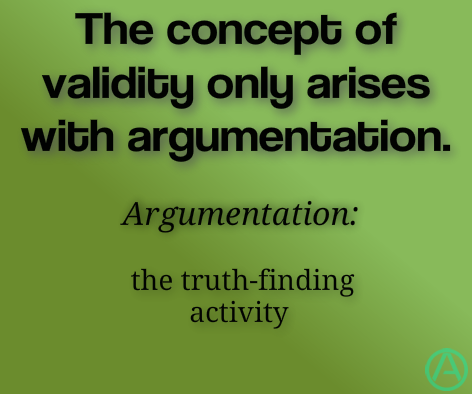 The whole idea of validity of any claim, including normative claims, only comes into existence with argumentation, i.e., the interaction between two or more speakers where they exchange propositions and questions for the purpose of finding truth. Even when one enters into a monologue one uses propositions, i.e., argumentative means.
The whole idea of validity of any claim, including normative claims, only comes into existence with argumentation, i.e., the interaction between two or more speakers where they exchange propositions and questions for the purpose of finding truth. Even when one enters into a monologue one uses propositions, i.e., argumentative means.
This truth leads to the conclusion that whatever is argumentatively justifiable is justifiable and whatever is argumentatively unjustifiable is unjustifiable. One could not justify a claim stating otherwise.
If one cannot deny a claim in argumentation, then the claim must be valid simply because it cannot be said otherwise without contradiction.
For example, the claim, “One’s exclusive use of their body is justifiable,” cannot be argumentatively denied (let’s assume there is no initiation of force). The norm of ownership of one’s body must be accepted if one is to enter into argumentation. Otherwise, the activity would not be about truth-finding. Pulling somebody’s arms uninvitedly is not about truth-finding. As soon as the activity stops being about making claims or asking questions for the purpose of truth-finding it is no longer argumentation but some other activity.
[…] ← Argumentation and Validity […]
[…] discuss this in http://www.anarcho-libertarian.com/index.php/2016/06/26/argumentation-and-validity/ and Hoppe also discusses this on page 400 of the 2nd edition of The Economics and Ethics of Private […]